Understanding Content Generation Meaning: Trends for 2025


Content generation is redefining how businesses connect with their audiences. Did you know that over 55% of marketers now rely on AI-powered tools for their content processes? That's a huge shift. But here's the kicker: the tools themselves are just the starting point. What truly matters is how brands blend creativity and strategy to create authentic, engaging content that resonates with consumers. Buckle up as we dive into the transformative landscape of content generation.
Table of Contents
- Defining Content Generation Meaning
- Benefits Of Content Generation
- Content Generation Best Practices
- Future Trends In Content Generation
Quick Summary
| Takeaway | Explanation |
|---|---|
| Content generation is a strategic process | It involves more than just creating content; it requires systematic planning, audience research, and optimization for effective engagement and visibility. |
| Quality over quantity is essential | Producing fewer pieces of high-quality, authentic content is more effective than saturating channels with mediocre material. |
| AI tools enhance content generation | AI can assist in creating and optimizing content, enabling businesses to personalize and scale their strategies while maintaining human insights. |
| Engagement through interactivity is crucial | Interactive content like polls and quizzes significantly increases audience engagement, making it a key component of content strategies moving forward. |
| Omnichannel strategies are vital | Brands must deliver seamless content experiences across multiple channels to meet evolving consumer expectations and maximize reach. |
Defining Content Generation Meaning
Content generation refers to the process of creating valuable, relevant information in various formats for digital consumption. At its core, content generation meaning encompasses the deliberate creation of materials that inform, entertain, or persuade an audience. But what exactly does this mean in today's digital landscape?
The Essence of Content Generation

Content generation is more than just producing words on a page. It's the strategic development of materials that serve specific purposes for businesses and audiences alike. Whether it's blog posts, videos, infographics, or social media updates, content generation involves crafting messages that resonate with target audiences.
The meaning of content generation has evolved significantly over the years. What once meant simply writing articles or creating basic visuals now encompasses a sophisticated ecosystem of content types across multiple platforms. According to Deloitte Insights, "Hyperscale social video platforms are shaping digital media trends, challenging traditional media and redefining content consumption."
Content Generation vs. Content Creation
Many use these terms interchangeably, but subtle differences exist. Content creation typically refers to the actual production of individual pieces. Content generation, however, suggests a more systematic approach—often involving strategy, planning, and scalable processes.
Content generation meaning in business contexts often includes:
- Strategic planning of content calendars
- Audience research and persona development
- Content optimization for search engines
- Distribution across appropriate channels
- Performance measurement and refinement
More than half of marketers (over 55%) now rely on AI-powered tools to generate or enhance their content processes, according to We Are Social's research. This highlights how the meaning of content generation continues to evolve with technology.
The Value Proposition of Generated Content
The true meaning of content generation lies in its value creation. Effective content doesn't just exist—it serves purposes like building brand awareness, educating customers, generating leads, or driving conversions.
One common misconception is that AI-generated content lacks creativity and is easily identified as inauthentic. However, this view is increasingly outdated. AI-generated content is evolving rapidly to produce more nuanced, high-quality material that's often indistinguishable from human-created content, as noted by NoGood's research.
For small businesses and marketers, understanding content generation meaning is essential for developing effective digital strategies. It's about creating materials that connect with audiences, answer their questions, and guide them through the buyer's journey—ultimately delivering value to both the business and its customers.
Benefits of Content Generation
Effective content generation delivers numerous advantages for businesses of all sizes. From boosting visibility to building lasting customer relationships, understanding these benefits helps clarify the value of investing in content strategies.
Driving Brand Awareness and Visibility
Consistently generating high-quality content dramatically increases your brand's digital footprint. When you regularly publish valuable information that addresses your audience's needs, you create multiple entry points for potential customers to discover your business.
Search engines reward fresh, relevant content with better rankings. By targeting the right keywords and topics, your content can appear in search results when potential customers are actively looking for solutions you provide. This organic visibility often delivers higher-quality leads than paid advertising alone.
Interactive content experiences, such as polls and quizzes, result in engagement rates approximately 2x higher than static content, according to NoGood's research. This increased engagement translates directly to improved brand awareness and memorability.
Establishing Authority and Trust
Content generation is one of the most effective ways to demonstrate expertise in your industry. When you share valuable insights, solve common problems, and address customer pain points, you position your brand as a trusted authority.
The Deloitte Digital Marketing Trends team notes that brands must "Connect and captivate omnichannel experiences—brands must integrate digital and physical touches seamlessly to meet evolving consumer expectations" to build trust in today's market, as reported in their 2025 Marketing Trends analysis.
Consumers increasingly value authenticity. This explains why employee-generated content has become a powerful trust-building tool. According to We Are Social USA, "Employee-generated content will grow rapidly to revolutionize how brands connect with audiences and customers." When team members share their expertise and experiences, it humanizes your brand and fosters deeper connections.
Generating Leads and Conversions
Strategic content generation creates a pipeline of qualified leads. By addressing specific customer needs at different stages of the buyer's journey, you can capture interest and guide prospects toward conversion.
Content serves as a 24/7 salesperson, working continuously to educate prospects about your offerings. Educational content helps customers understand the value of your products or services, reducing friction in the sales process and shortening sales cycles.
Particularly valuable or in-depth content can be gated behind contact forms, creating opportunities to collect leads while providing genuine value. This approach generates leads who are genuinely interested in your expertise.
Cost-Effective Long-Term Results
Unlike paid advertising that stops delivering results when you stop paying, content continues working for your business long after publication. A well-researched article can continue generating traffic, leads, and sales for years.
Content creation has become more accessible and efficient. The misconception that "video content is too resource-intensive for most brands to produce consistently" is outdated. As Meltwater points out, "Advancements in production tools and mobile devices have democratized video content creation, making it accessible and efficient for organizations of all sizes."
With 90% of marketers reporting investment in content marketing with plans to maintain or increase that investment, according to Meltwater's research, the business case for content generation is stronger than ever. The long-term ROI typically exceeds that of many other marketing approaches, making it an essential strategy for sustainable business growth.
Content Generation Best Practices
Creating effective content requires more than just good writing skills. To maximize the impact of your content generation efforts, follow these proven best practices that help ensure your content resonates with your audience and drives business results.
Start With Strategic Planning
Effective content generation begins with clear goals and purpose. Before creating a single piece of content, define what you want to achieve. Are you looking to build brand awareness, generate leads, establish thought leadership, or drive direct sales? Each goal requires a different content approach.
Developing detailed audience personas is critical for content that connects. Go beyond basic demographics to understand your audience's challenges, goals, preferred content formats, and where they consume information. This deep understanding will guide your content creation.
As the Deloitte Digital Marketing team emphasizes, omnichannel strategies are crucial in 2025, with "brands striving to deliver seamless content experiences across a blend of digital and traditional channels" according to their marketing trends research. Your content planning should account for this multi-channel reality.
Focus on Quality and Authenticity
In today's content-saturated world, quality trumps quantity every time. It's better to publish fewer pieces of exceptional content than to flood channels with mediocre material. Thoroughly research topics, provide unique insights, and ensure factual accuracy in everything you publish.
One powerful trend reshaping content strategies is the rise of authentic, human-centered content. According to Meltwater, "Humanizing the content experience is a top trend, with marketers focusing on creating more authentic, relatable content—often by featuring employees or user-generated stories." This approach builds trust and strengthens audience connections.
Prioritize original research, unique perspectives, and stories only your brand can tell. Differentiation is increasingly important as content volume grows across all industries. Find your unique voice and stick with it consistently.
Optimize for Discovery and Engagement
Even the best content won't deliver results if no one finds it. Incorporate relevant keywords naturally throughout your content, focusing on terms your audience actually searches for. Use tools like Google Keyword Planner or SEMrush to identify these terms.
With attention spans shrinking, format your content for easy consumption. Use clear headings, short paragraphs, bullet points, and visual elements to break up text. These formatting practices significantly improve readability and engagement.
Adopt a data-driven approach to content optimization. Test different headlines, formats, and distribution channels to see what works best. According to NoGood, "Short-form video content has emerged as a dominant trend in content generation, fueled by the popularity of platforms like TikTok, Instagram Reels, and YouTube Shorts, which cater to increasingly shorter audience attention spans." This insight should inform your format decisions.
Leverage Technology Appropriately
AI tools can dramatically improve content generation efficiency when used strategically. These tools excel at research assistance, content outlines, and first drafts, allowing your team to focus on adding unique insights and human touches.
A common misconception is that "AI-generated content lacks creativity and is easily identified as inauthentic." The reality is more nuanced. According to NoGood, "AI-generated content is becoming more sophisticated, enabling brands to automate the creation of text, images, and videos at scale while improving quality and personalization." The key is using AI as a starting point, not the final product.
As privacy regulations evolve, first-party data becomes increasingly valuable for content personalization. Deloitte Digital notes that "First-party data is increasingly important for content personalization as privacy concerns rise and third-party cookies fade out, forcing marketers to collect and leverage their own data sources." Use this data responsibly to tailor content to specific audience segments.
By following these best practices, businesses of all sizes can develop content generation strategies that build meaningful connections with audiences while delivering measurable business results. Remember that effective content generation is both an art and a science—requiring creativity, strategic thinking, and data-driven optimization.
Future Trends in Content Generation

The content generation landscape is evolving rapidly. Understanding emerging trends helps businesses stay ahead of the curve and adapt their strategies accordingly. Here's what to watch for as we move toward 2025 and beyond.
The Rise of Video-First Content Strategies
Video content continues its impressive growth trajectory, with short-form video leading the charge. According to research from NoGood, short-form video saw a remarkable 50% year-over-year growth in overall views and engagements across major platforms as of late 2024. This isn't surprising when we consider that over 70% of consumers globally prefer video content over text-based posts from brands, as reported by Deloitte.
The proliferation of easy-to-use video creation tools has democratized video production. Even small businesses with limited resources can now create compelling video content. This accessibility has accelerated the shift toward video-first content strategies across industries and business sizes.
Live streaming and real-time video engagement are becoming essential components of content strategies. Meltwater notes that "Real-time engagement, such as live streaming and interactive polls, is increasingly integral to content strategies, helping brands build stronger, immediate connections with audiences." This trend reflects consumers' growing preference for authentic, unfiltered content experiences.
AI-Powered Content Creation
Artificial intelligence is transforming how content is created, optimized, and personalized. AI tools now generate everything from blog outlines to full articles, social media captions, and even basic video scripts. The quality of AI-generated content continues to improve dramatically.
However, the most effective approach combines AI efficiency with human creativity. AI excels at processing vast amounts of data and identifying patterns, while humans provide emotional intelligence, brand voice alignment, and original thinking. This collaborative approach delivers the best of both worlds.
AI will increasingly enable hyper-personalization at scale. By analyzing user behavior and preferences, AI systems can help create content variations tailored to different audience segments. This level of personalization was previously impossible at scale due to resource constraints.
Immersive and Interactive Experiences
Consumers increasingly expect content that goes beyond passive consumption. According to Meltwater, "Augmented reality (AR) and virtual reality (VR) applications are expanding in content marketing, offering immersive experiences that drive engagement and differentiation." These technologies are becoming more accessible as development costs decrease and consumer devices improve.
Interactive content—polls, quizzes, calculators, configurators—will continue gaining prominence. This content type drives significantly higher engagement rates compared to static content, with NoGood reporting approximately 2x higher engagement for interactive experiences.
The distinction between content and experience will blur further. Brands that treat content as an experience—something audiences actively participate in rather than passively consume—will capture attention more effectively in increasingly crowded digital spaces.
Content Distribution Evolution
The ways audiences discover and consume content continue to change. Multi-channel content strategies are no longer optional. As Deloitte Digital observes, "Omnichannel strategies are crucial, with brands striving to deliver seamless content experiences across a blend of digital and traditional channels."
Content decentralization is accelerating, with brands creating content specifically designed for third-party platforms rather than always driving traffic back to owned properties. This approach meets audiences where they are while expanding reach and engagement.
Voice search optimization will become increasingly important as voice assistants continue gaining popularity. Content must be structured to answer specific questions naturally, as voice searches typically use conversational language patterns.
The future of content generation will reward businesses that embrace technological innovation while maintaining a strong focus on authenticity and audience value. By understanding these trends and adapting strategies accordingly, companies of all sizes can position themselves for content marketing success in the years ahead.
Frequently Asked Questions
What is content generation?
Content generation is the process of creating valuable, relevant information in various formats for digital consumption, aimed at informing, entertaining, or persuading an audience.
How does content generation differ from content creation?
Content generation is a systematic approach involving strategic planning, audience research, and optimization, while content creation typically refers to the individual production of content pieces.
Why is content generation important for businesses?
Content generation is crucial as it helps drive brand awareness, establish authority, generate leads, and provide cost-effective long-term results by continuously engaging audiences and enhancing visibility.
What trends in content generation should we expect by 2025?
By 2025, we expect to see a rise in video-first content strategies, increased use of AI-powered content creation, immersive experiences through AR/VR, and an evolution in content distribution methods to meet changing consumer habits.
Elevate Your Content Strategy with BabyLoveGrowth.ai!
As you’ve learned from the insights in "Understanding Content Generation Meaning: Trends for 2025," effectively bridging creativity and strategy is essential to stand out in today’s content-saturated marketplace. Businesses are grappling with creating high-quality, engaging materials while optimizing for search engines—a dual challenge that requires innovative solutions.
🎯 Imagine this: Your brand not only captures attention but also builds genuine connections with your target audience through tailored content, driving ‘engagement rates’ and brand awareness as discussed in the article.
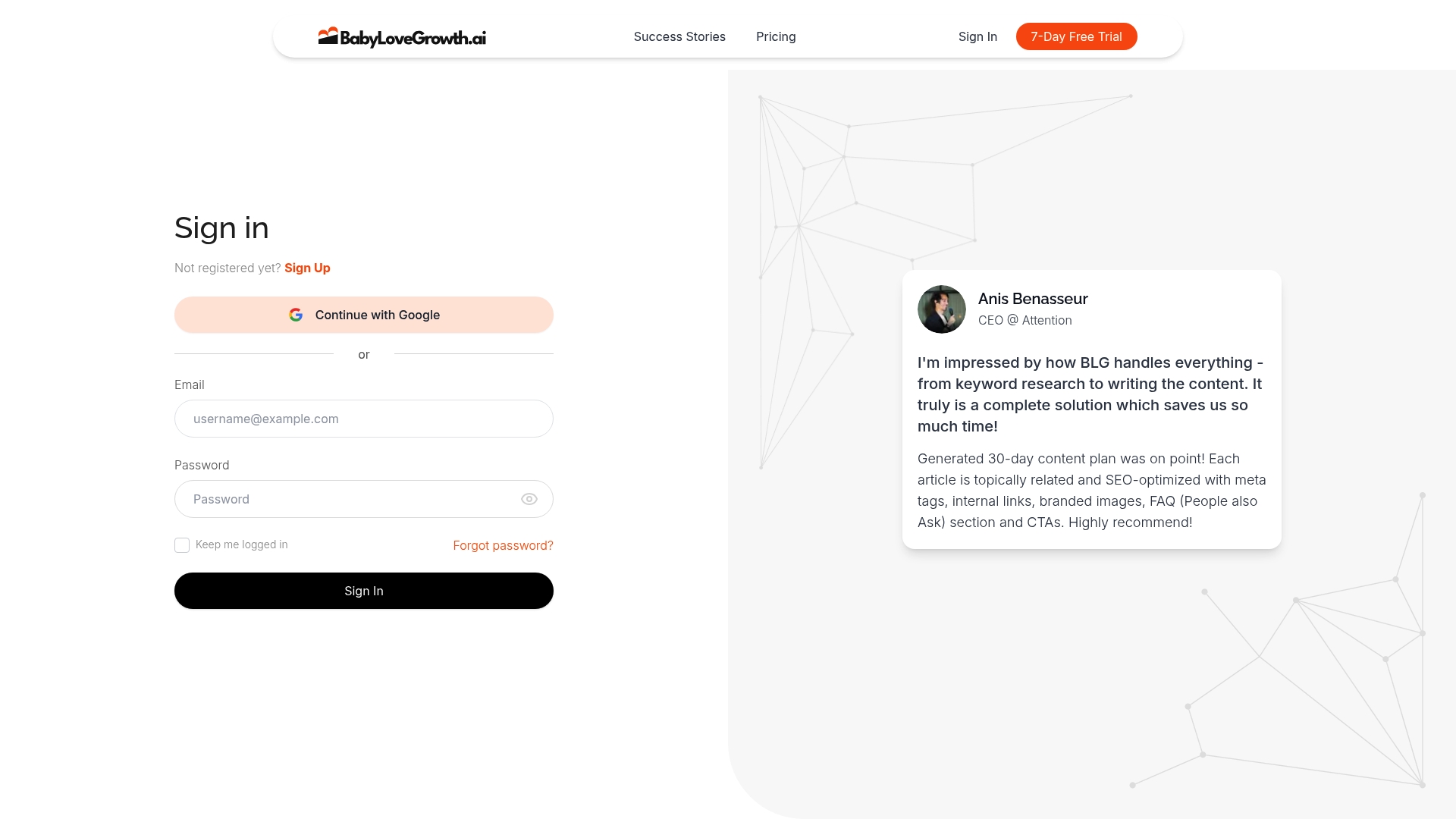
Now’s the perfect time to transform your content marketing efforts! At BabyLoveGrowth.ai, we specialize in automated SEO content generation that enhances your online visibility with minimal effort. Our sophisticated three-step process ensures you get:
- An in-depth business analysis to understand your needs.
- A customized 30-day content plan that sets you on the path to success.
- Automatic generation of SEO-optimized articles that resonate with your audience.
Don’t let your competitors outshine you! Start optimizing your content strategy today and concentrate on what you do best while we handle the digital landscape. Visit us NOW at BabyLoveGrowth.ai and take the first step toward greater visibility and engagement!
Recommended Articles
- Engine Optimization Meaning: Clear Benefits Unveiled
- SEO for Healthcare Providers: Proven Strategies to Grow Your Practice
- What is Website Optimization? Your Simple Guide to Boost Site Performance
- SEO for Dentists: Boost Your Practice with Proven Strategies
- Understanding Nofollow Backlink: What You Need to Know for SEO Success
Smart SEO,
Faster Growth!
Most Read Articles
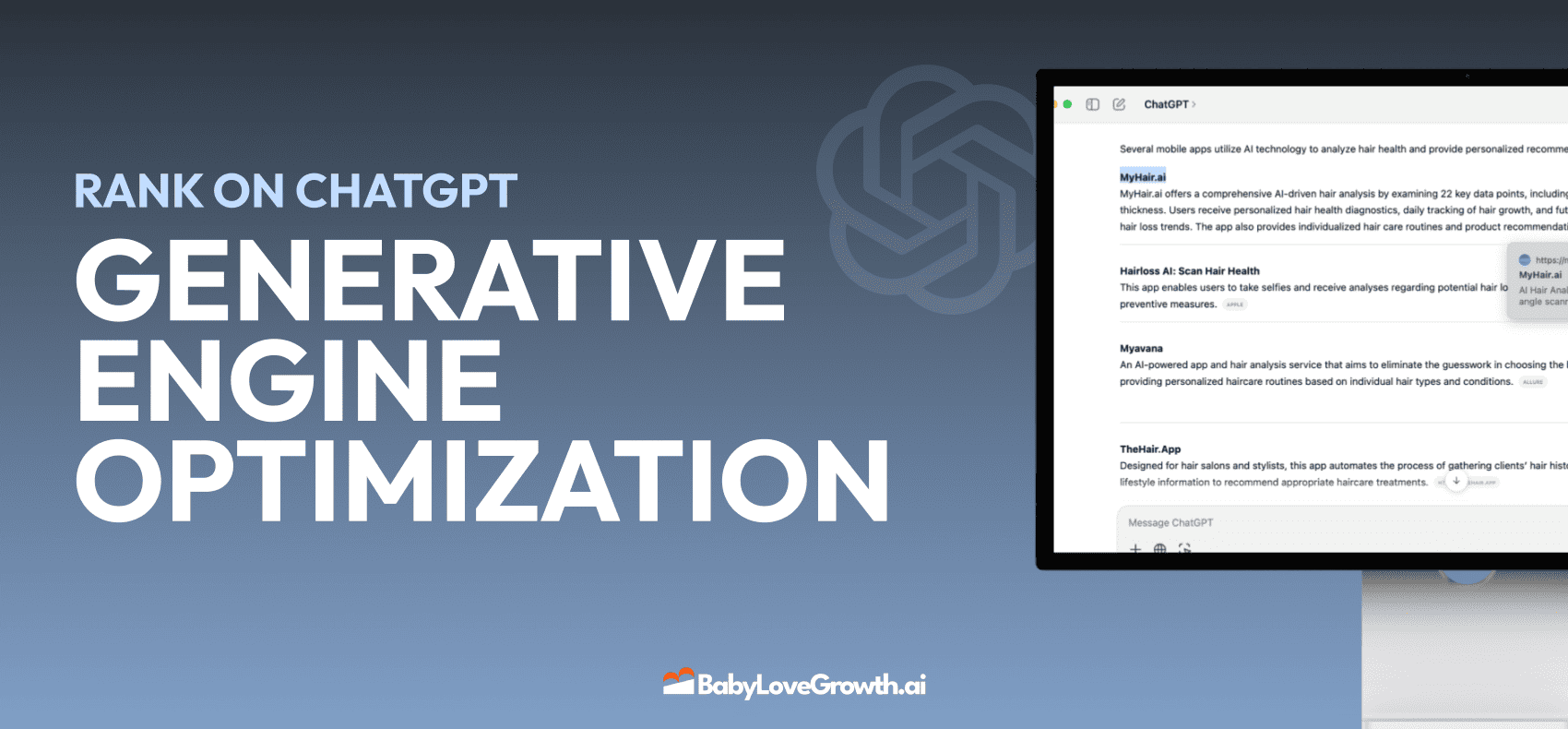
Generative Engine Optimization (GEO)
Learn how Generative Engine Optimization (GEO) helps your content rank in AI search engines like ChatGPT and Google AI. This comprehensive guide explains the differences between SEO and GEO, why it matters for your business, and practical steps to implement GEO strategies for better visibility in AI-generated responses.
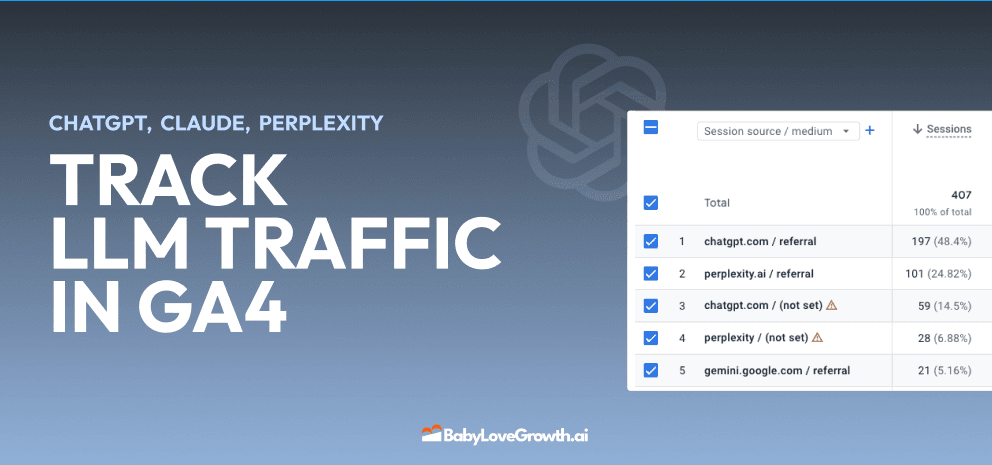
Track LLM Traffic in Google Analytics 4 (GA4)
Learn how to track and analyze traffic from AI sources like ChatGPT, Claude, Perplexity, and Google Gemini in Google Analytics 4. This step-by-step guide shows you how to set up custom filters to monitor AI-driven traffic and make data-driven decisions for your content strategy.
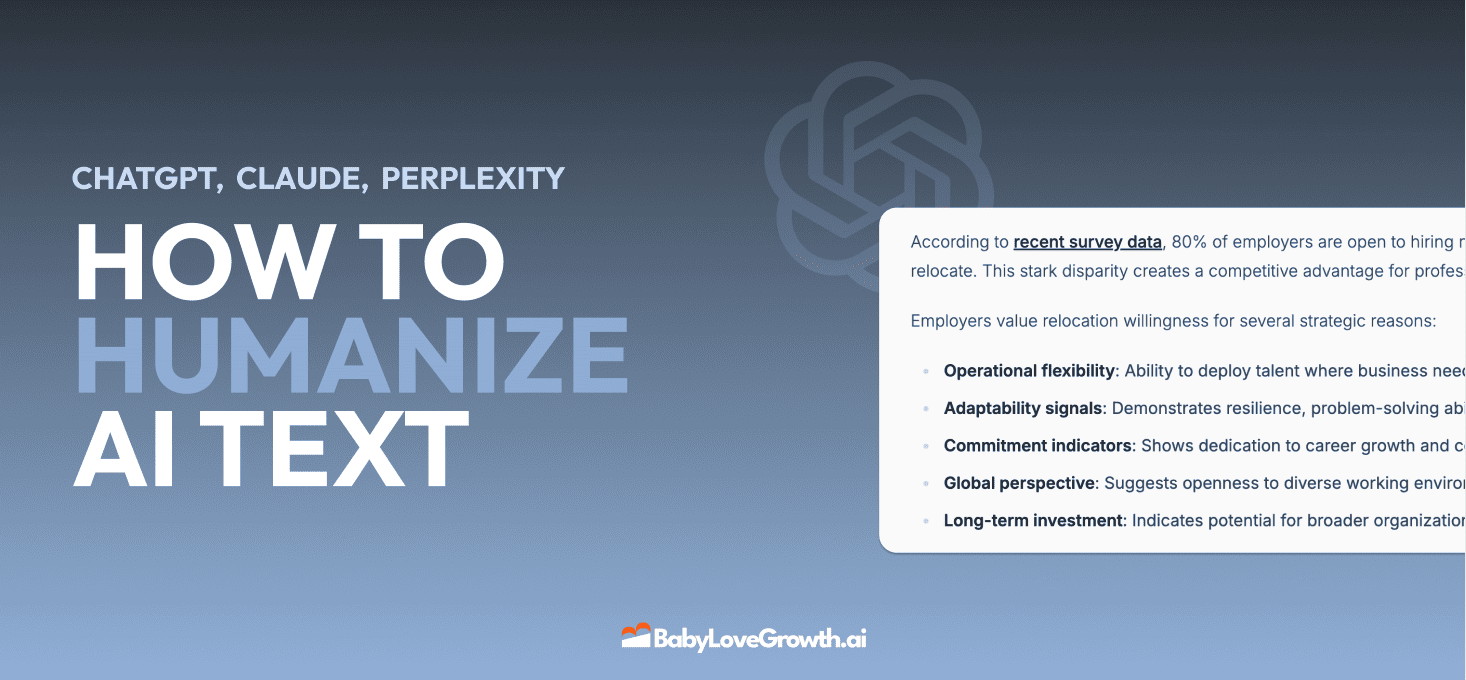
How to Humanize AI Text with Instructions
Learn practical techniques to make AI-generated content sound more natural and human. This guide covers active voice, direct addressing, concise writing, and other proven strategies to transform robotic text into engaging content.
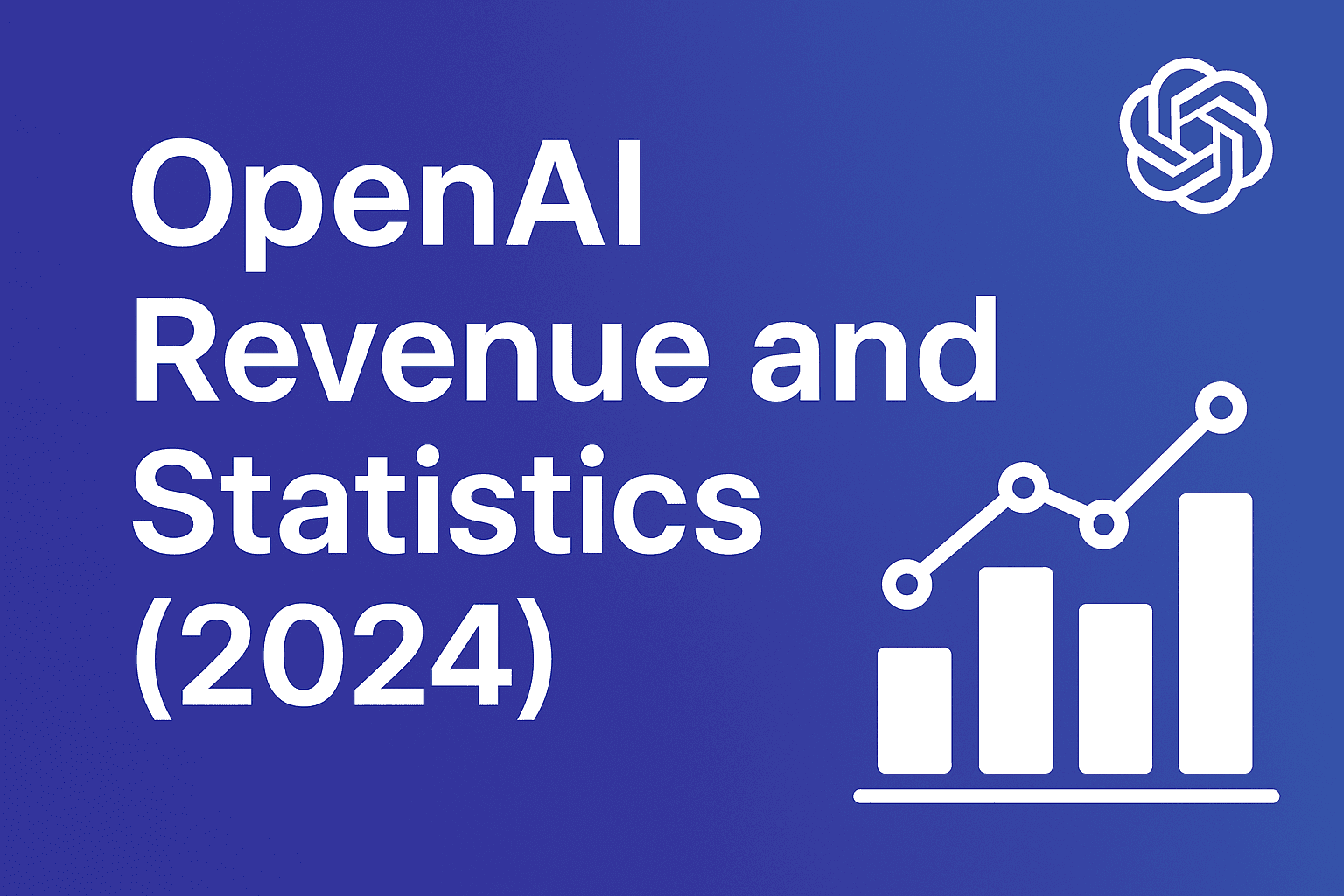
Open AI Revenue and Statistics (2024)
Comprehensive analysis of OpenAI financial performance, user engagement, and market position in 2023. Discover key statistics including $20B valuation, $1B projected revenue, and 100M+ monthly active users.